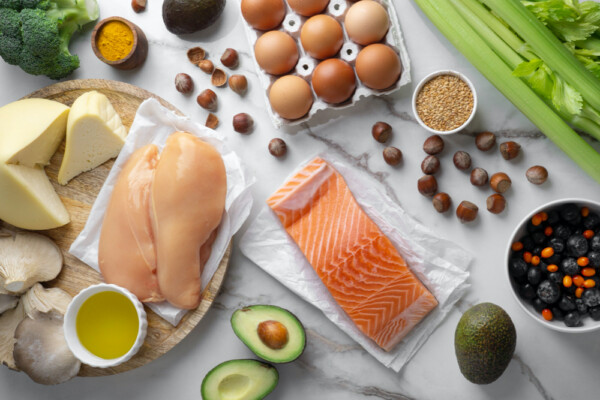- Fast results
- 4,000+ locations
- 4.8 star rating
Need Help? (888) GET LABS


Pregnancy leads to many changes in a woman’s body, including certain risks for special types of complications. For example, gestational diabetes mellitus can occur during pregnancy due to short insulin supplies, as prompted by the placental hormones. As a result, a gestational diabetes diet may be necessary to ensure fetal development and the pregnancy is healthy altogether.
As you read further, you’ll find out what goes into a gestational diabetes diet and meal plan and how serious this health condition can get.
A gestational diabetes mellitus (GDM) diet consists of a balanced diet, emphasizing on controlling sugar intake. As such, it includes organic sources of nutrients, less processed food, and minimal high-carbohydrate or sugary foods.
The goal of a gestational diabetes diet is to help pregnant women lower their high blood glucose levels. At the same time, it allows for maintaining a healthy weight and preventing other complications.
Since nutrients play a crucial role in fetal development and the overall health of the mother, it’s best to consult your doctor and get a green light for when you should go for a gestational diabetes diet. Otherwise, you might trigger a risk that proved to be non-existent before.
Nevertheless, if you’re advised to adopt a gestational diabetes meal plan, consider the following.
Fruits and vegetables: low carbohydrate, high fiber
Protein-based foods: high in folic acid, iron, and zinc
Healthy fats
*While fish and seafood are rich in omega-3 fatty acids, which are essential nutrients for pregnancy, they can also contain mercury that could endanger your baby. Salmon is dubbed as an exemption due to its relatively low rate of mercury absorption. But fish like tuna, mackerel, and swordfish should be best avoided.
Aside from the type of foods you can include or exclude from your gestational diabetes meal plan, consider the proportion. Consult your obstetrician and/or nutritionist for the most accurate meal planning.

Gestational diabetes can threaten a healthy pregnancy as it increases the risk of several conditions, including preeclampsia, preterm birth, fetal macrosomia, and stillbirth.
In the US, 2% to 10% of pregnant women are affected by gestational diabetes. While these figures are relatively smaller, the chances of developing the condition increase if you’re unaware of how your body’s response to sugar changes during pregnancy.
In the later stage of pregnancy, placental hormones block the production of insulin. Insulin is a staple hormone produced by the pancreas to control blood sugar. Therefore, any blockage or shortage in the release of insulin to the bloodstream increases glucose levels. This characterizes diabetes mellitus.
The very mechanism of how GDM develops in pregnant women means that even those without diabetes prior to pregnancy can be at risk, especially those who are not careful with their diet. Other factors influencing gestational diabetes include the following:
In most cases, GDM can be addressed through a strict dietary plan. Your obstetrician may prescribe insulin therapy depending on the degree of the condition.
After giving birth, you should find your blood glucose levels to return to normal if you didn’t have diabetes to begin with. However, it could extend after pregnancy, especially in later years, if your diet consists of sugary foods.
Pro tip: Although you can get rid of GDM after the baby is born, you still have the risk of developing type 2 diabetes mellitus. So be on the lookout for early symptoms of diabetes and physical changes it may trigger.
In light of complications like gestational diabetes, pregnant women ought to be more cautious with their dietary habits and preferences. As such, it’s crucial to check with your obstetrician or nutritionist regarding the nutritional goals you should hit. While these can be tailored to your health status, here are actions you can take in general.
Aside from being selective of the food you eat and stirring clear from a sugary diet, it’s best to maintain healthy blood pressure. Hypertension or high blood pressure, coupled with gestational diabetes, increases your risk of preeclampsia.
Preeclampsia can be a life-threatening condition characterized by a sudden increase in blood pressure, which can be aggravated by GDM. It could lead to placental disruption or the detachment of the placenta from the uterus, miscarriage, organ failure, and preterm birth.
Other than high blood glucose levels, check out other preeclampsia risk factors you should know about.
Some of the things you can do to control your blood pressure include the following:
Did You Know? High blood pressure as a whole can be worse in women than in men. Read further into how you can lower blood pressure in four steps, whether you’re pregnant or not.
Gaining weight is part of a healthy pregnancy. However, how much weight you increase impacts the progression of fetal development and your overall health.
Pregnant women can expect to gain a few pounds on account of the developing baby, anatomical changes like breast and uterus enlargement, production of extra blood and amniotic fluid, as well as placental growth. But you can also gain weight from mere indulgence or poor dietary choices.
Knowing what weight to maintain depends on your obstetrician’s assessment. Again, this is something that you can’t decide on your own or pattern based on recommendations outside a tailored clinical opinion.
Nonetheless, to help maintain a healthy weight, you’ll most likely follow a strict diet plan which coincides with the prescribed gestational diabetes diet and maintain regular exercise. For more details, check out these tips for keeping a healthy weight.
According to the American Congress of Obstetricians and Gynecologists, pregnant women should make sure to take these nutrients: folic acid, vitamins B, C, and D, calcium, omega-3 fatty acids, iron, and choline.
These nutrients are rich in various fruits and vegetables, lean meat, fatty fish, whole grains, and fortified cereals, as well as other enriched food products.
Your obstetricians may also recommend taking supplements, especially folic acid, as it plays a crucial part in fetal development. Find out which foods high in folic acid you can include in your diet to ensure the healthy growth of your baby.
For more information about your health and wellness growth during pregnancy, check out the nutritional requirements for pregnant women and how they can be taken care of.
Your doctor will provide a more tailored treatment plan for gestational diabetes, especially if it involves monitored insulin injections. At home, your treatment extends to following the recommended gestational diabetes diet and doing physical activities regularly. In short, you should focus on diet and exercise while taking the necessary medication for the condition.
You can drink coffee even if you have gestational diabetes. However, they have to be taken with caution and moderation. Although research shows that high consumption of coffee does not increase the risk for gestational diabetes, in general, pregnant women should keep their daily coffee intake below 200 mg. It is for this reason that you should still consult your doctor.
There is an increased risk for your baby to grow too big, which can result in health issues like obesity and respiratory problems. Plus, it can also lead to a difficult delivery. On the other hand, no evidence supports the idea that GDM can cause birth defects or other congenital diseases.
A gestational diabetes diet consists of foods that can help normalize your blood sugar, such as fibrous vegetables, grains, and lean meat. It also excludes those that are made of simple carbohydrates, which include sweets, starchy foods, and so on. While there are countless guides and recommendations on how to put up your gestational diabetes meal plan, always consult your doctor first, whether in person or via virtual consultation.
Additional Readings

10 Natural Food Sources of Folate (Folic Acid) For Pregnant Women
Pregnancy leads to many changes in a woman’s body, including certain risks for special types of complications.

5 Maternal Health Conditions That Are Influencing Premature Birth and How to Avoid Them
Finding out you are pregnant can be an overwhelming experience. A range of emotions is reasonably expected. When the joy or stress of the condition finally sinks in, there’s a chance that panic comes after.

11 Preeclampsia Risk Factors Every Pregnant Woman Should Know
Countless studies have uncovered the risk factors or preeclampsia that pregnant women should watch out for. By learning about these conditions, your obstetrician can recommend the appropriate preventive measures and treatment. In addition, it increases your chances of dodging preeclampsia altogether.

© Copyright 2024 Personalabs. All Rights Reserved.

We now offer pharmacy discounts through our PersonalabsRx platform.
We now offer pharmacy discounts through our PersonalabsRx platform.